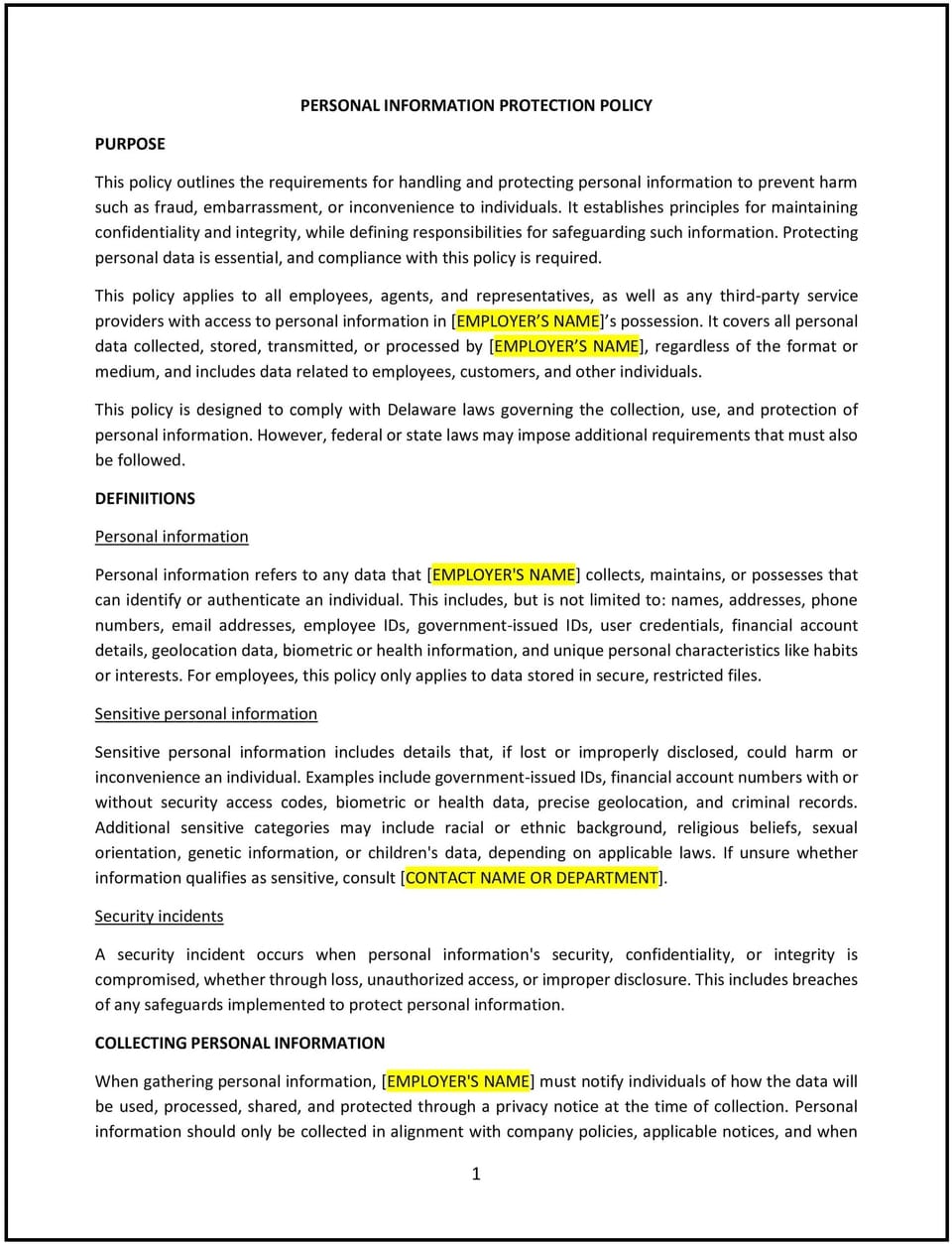Personal information protection policy (Delaware)

Personal information protection policy (Delaware)
A personal information protection policy helps Delaware businesses safeguard sensitive employee and customer data, ensuring compliance with Delaware and federal privacy laws. This policy outlines guidelines for data collection, storage, access, and breach response to mitigate risks and protect the organization’s reputation.
By implementing this policy, businesses can demonstrate their commitment to data privacy, reduce the risk of breaches, and comply with applicable legal requirements.
How to use this personal information protection policy (Delaware)
- Define personal information: Specify the types of personal data covered by the policy, such as Social Security numbers, financial records, health information, and contact details.
- Establish data handling practices: Outline procedures for collecting, storing, and accessing personal information securely.
- Limit access: Restrict access to personal information to authorized personnel only, using role-based permissions and multi-factor authentication.
- Implement data security measures: Require the use of encryption, secure storage solutions, and regular system updates to protect sensitive information.
- Outline breach response procedures: Include steps for identifying, reporting, and addressing data breaches, as well as notifying affected individuals and authorities.
- Monitor compliance: Regularly audit data handling practices to ensure adherence to the policy and relevant laws.
Benefits of using this personal information protection policy (Delaware)
This policy offers several benefits for Delaware businesses:
- Ensures compliance: Aligns with Delaware and federal privacy laws, such as the Delaware Online Privacy and Protection Act, reducing legal risks.
- Protects sensitive data: Mitigates the risk of unauthorized access or breaches, safeguarding employee and customer trust.
- Enhances reputation: Demonstrates the company’s commitment to privacy, building confidence among stakeholders.
- Reduces financial risks: Helps avoid fines or penalties associated with non-compliance or data breaches.
- Promotes transparency: Establishes clear guidelines for handling personal information responsibly and ethically.
Tips for using this personal information protection policy (Delaware)
- Communicate the policy clearly: Ensure all employees understand their roles and responsibilities in protecting personal information.
- Train employees: Provide regular training on data privacy best practices and compliance with relevant laws.
- Use technology: Implement tools to monitor and secure data, such as encryption software and access control systems.
- Encourage reporting: Create a process for employees to report potential breaches or risks promptly.
- Review regularly: Update the policy to reflect changes in Delaware privacy laws, industry standards, or technological advancements.
Q: Why is a personal information protection policy important for my business?
A: This policy ensures compliance with privacy laws, protects sensitive data, and builds trust with employees, customers, and other stakeholders.
Q: What types of personal information are covered by this policy?
A: Covered information typically includes Social Security numbers, financial data, health records, and any other data that could identify an individual.
Q: How can my business ensure data is stored securely?
A: Use secure storage solutions, encryption, and regular system updates, and restrict access to authorized personnel only.
Q: What steps should my business take in the event of a data breach?
A: Follow the policy’s breach response procedures, including identifying the breach, notifying affected parties and authorities, and implementing corrective actions.
Q: How often should this policy be reviewed?
A: This policy should be reviewed annually or whenever Delaware privacy laws, technological advancements, or company practices change to ensure continued compliance and effectiveness.
This article contains general legal information and does not contain legal advice. Cobrief is not a law firm or a substitute for an attorney or law firm. The law is complex and changes often. For legal advice, please ask a lawyer.


